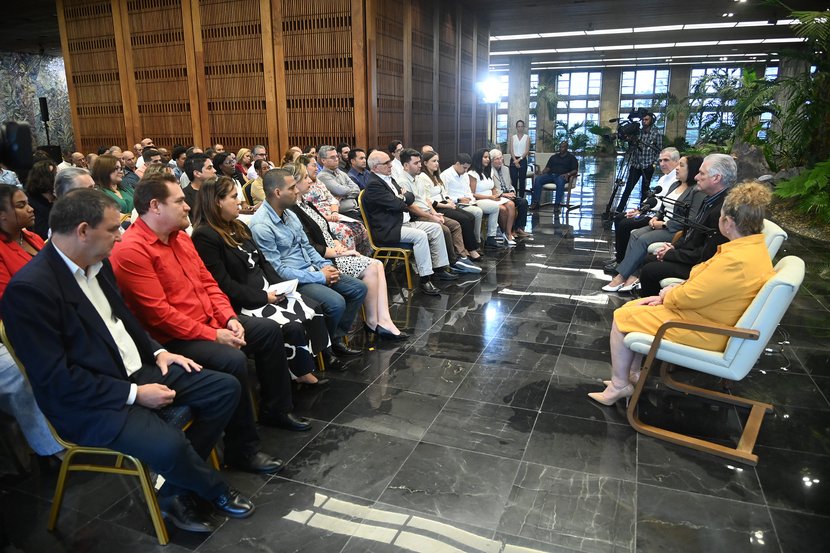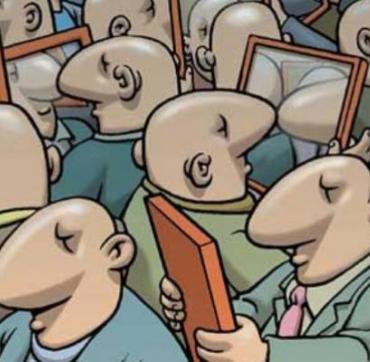Fidel, Present in the Achievements of the Cuban Communications Sector
especiales

The First Secretary of the Central Committee of the Party and President of the Republic, Miguel Díaz-Canel Bermúdez, held a meeting with prominent workers in the Communications sector on February 22.
Fidel's name was repeated several times during the meeting held by the First Secretary of the Central Committee of the Party and President of the Republic, Miguel Díaz-Canel Bermúdez, with prominent workers in the Communications sector on February 22. His connection with information and communication technologies was present in the different stages of the revolutionary struggle.
Díaz-Canel meets with workers from the Communications, IT and Electronics sector
On February 24, 1958, the Radio Rebelde station was founded in Sierra Maestra mountain range. It was Che’s initiative and the support of the Commander in Chief, where radio amateurs and technicians played a very important role, setting up the transmitting equipment for its broadcast and then assembling others, until creating a system of 32 radio stations that would spread the truth of the Cuban Revolution throughout our country and abroad. That’s why, according to Fidel, Radio Rebelde […] was an extremely important military communications center, in addition to having been an instrument of mass dissemination that played a political role of great significance throughout the war […]1.
During the exchange, the Cuban president insisted on continuing to put into practice that idea of the historic leader of the Revolution, which called for the need to be aware of the latest advances in technologies related to information and communication and telecommunications and to make these advances available for the development of the country, for the education, culture and well-being of our people.
During a visit to the Digital Research Center (DRC), subsidiary to the University of Havana in 1972, he said: […] Comrades, I have come here after seeing that computer - he was referring to the IRIS 50 - where one can hardly enter, where the people have no access, to ask you to make many computers so that the people, the students, can have access to them, study them, learn computing. We are a country without natural resources; but we have a very important resource, the intelligence of the Cuban, which we have to develop, computing achieves that and I am convinced that Cubans have a special intelligence to master computing […]2. [ Collective of authors: Tomás López Jiménez, Melchor Félix Gil Morell and Adriana Estrada Negrín: Moments of the development of Information Technology and its teaching in Cuba. www.uci.cu ]

The First Secretary of the Central Committee of the Party and President of the Republic, Miguel Díaz-Canel Bermúdez, held a meeting with prominent workers in the Communications sector on February 22. Photos: Estudios Revolución
There are many programs and projects created and promoted by Fidel that today are references to keep advancing towards development. Among them: the training of personnel in the field of computing in higher education and later in all levels of education; the Youth Computer and Electronics Club program launched on September 8, 1987, which has allowed more than 5.5 million Cubans to graduate from different courses; the creation of the Health computer networks (Infomed) and universities networks (Reduniv) between 1992 and 1993; the founding of Cubacel, which began operations on December 11, 1991; the establishment of the Cuban Telecommunications Company (ETECSA) in 1994 to halt the deterioration of the country's telecommunications network and to undertake development in this important sector; Internet access for journalists, health personnel, scientists, and universities; the inauguration of the University of Computer Sciences (UCI) in 2002, which has graduated thousands of professionals in this field; the founding of computer science polytechnics in all provinces of the country; the Television Rooms program that allowed more than half a million Cubans living in mountainous areas to access the television signal and the launch of the two educational channels in 2003 and 2004, a dream come true, if we take into account that since 1961 the Commander planned to use television for educational purposes and for the dissemination of culture.
As we celebrate in our country the day of the communications, information technology and electronics worker, coinciding with the 67th anniversary of Radio Rebelde, we remember that the more than 40 thousand workers in the communications sector have maintained the vitality of the telecommunications network, radio and television transmissions, postal operations and information communication services over these years by sheer of inventiveness, innovation and talent.
The concrete achievements and growth in various indicators bear witness of this. It’s enough to mention that in the last 10 years, telecommunications services have extended to the most remote places in the Cuban geography; 8 million mobile lines were reached, 95% enabled to access the Internet; the international connectivity bandwidth grew more than 40 times and the monthly average data consumption is above the Latin American average.
Fidel continues to open paths for us, calling us to create, to use science, to be systematic in action. His words spoken on March 7, 2006 at the event for the 15th anniversary of the Central Computing Palace are fully valid:
[…] Our fundamental points of progress at this time are medicine and computing and we will see what happens when all those talents are deployed or dedicated to creation […].
Translated by Amilkal Labañino / CubaSí Translation Staff














Add new comment